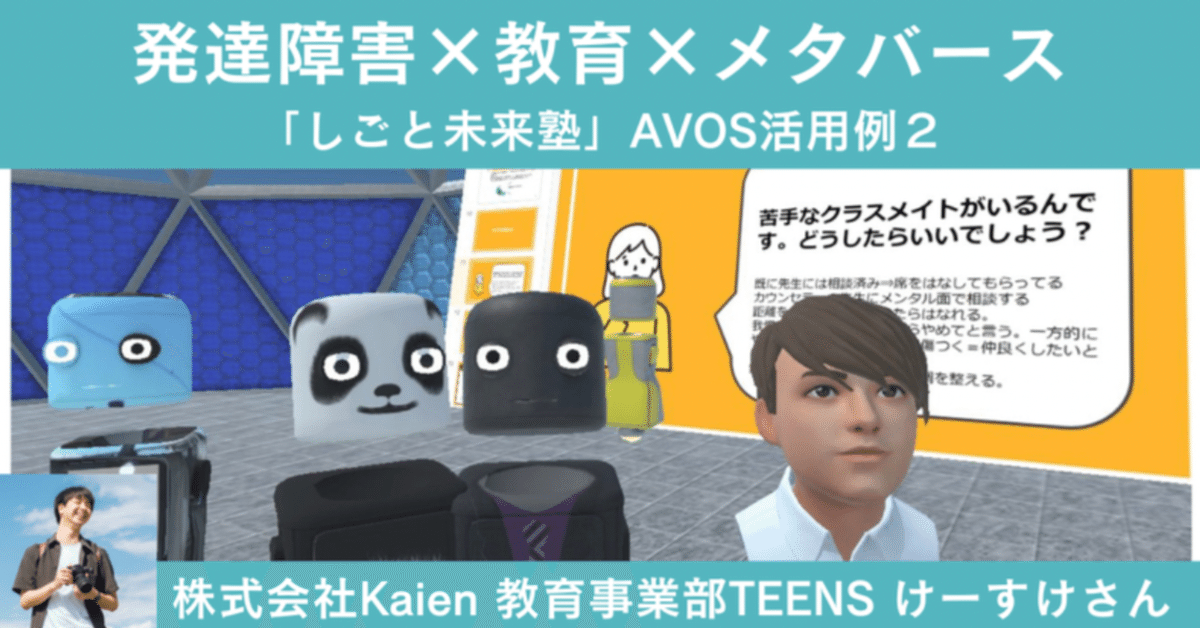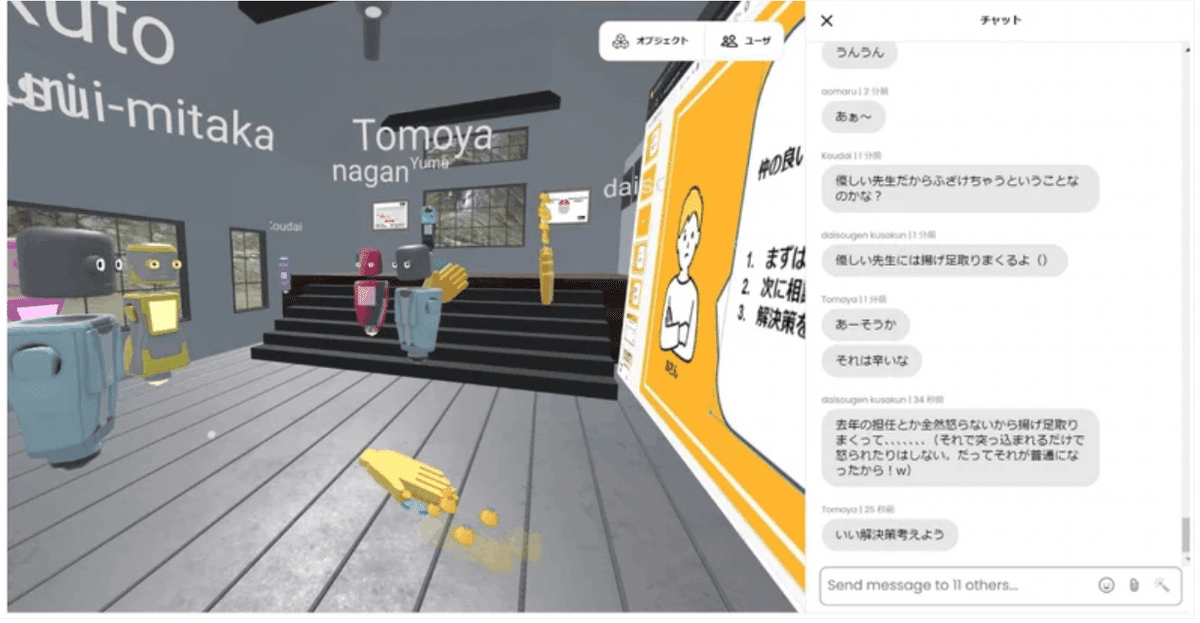
TEENS Kesuke-san's "Developmental Disabilities x Metaverse" AVOS Application Example 2|Worry Counseling Center"
Hello. In my last article, I introduced AVOS Application Example 1 "Quiz Contest" by TEENS Kesuke-san, Kaien Corporation, Education Division. It was very interesting to discover something new, so please read it from the link below.
Now, we are going to ask Mr. Kesuke about another example of AVOS utilization. The interview regarding this article is also available on YouTube. Please take a look if you like. (Click here for the full version of the video)
AVOS Application Example 2: "Worry Counseling Center".
At the end of the last issue of AVOS Application Example 1 "Quiz Contest" introduced in the previous issue, Mr. Kesuke said, "What you can express changes when there is movement."
He said that he discovered a unique benefit of the metaverse in the "Worry Counseling Center" program, which is implemented using AVOS.

The "Worry Counseling Center" is a program in which children with developmental disabilities can solve each other's problems. "What should I do if my good friend starts to joke around too much in class?" "What should I do if I have a classmate I don't like? What should I do?" "No matter how hard I try, I keep getting bumped on the shoulder by people on the street." These are just a few of the problems that arise in our program.
For example, "No matter how hard I try, people bump me on the shoulder on the street." The solution to this problem requires movement of the body, doesn't it? The solution to this problem requires movement of the body, doesn't it? Kesuke suggested to the child, "I will be the passerby, so try to dodge!" He then used avatars to simulate the situation, drawing out the children's ability to think and imagine.
In this way, the ability to add "movement" unique to the 3D world in the metaverse has expanded the range of what can be done. The metaverse, which allows us to move freely around the space, gives us a sense of the possibilities for the future.
(By the way...did you solve the above problem?)
As the children who participated in the program discussed with each other, they asked, "Why don't you just stop instead of trying to dodge?" If you stop and they bump into you, it's their fault, and if they think you are an obstacle, they will dodge." They found a solution while training with avatars in the Metaverse. The children who consulted with us about their problems were happy to report that in real life, "I don't go to them anymore, so the number of shoulder bumps has decreased a little!" It is wonderful that the discussions and training at the worry counseling center are being applied in real life.
On the Metaverse, "being able to move" increases the scope of support.
"Shigoto Mirai Juku" at TEENS, the education division of Kaien Corporation, offers services to help students acquire skills for future employment and independent living through a variety of programs. In addition to work skills such as manners and communication skills necessary in society, students can also learn skills for independence such as how to spend time at school and at home, and how to deal with the Internet and video games. (From the "Shigoto Mirai Juku" website)
For example, for the above-mentioned problem, "What should I do if my shoulder bumps into a passerby? For example, for the above problem, the students are trained to make a quick decision, such as "I think someone is going to bump into me, so I'll do this," and to consult with others and incorporate their opinions.
Before they started using AVOS, they would just "take an opinion and that was it." However, with the "movement" of 3D, they are now able to take an opinion and connect it to "let's try it out.
This has enabled them to provide some of the educational support that they provide in real life at the TEENS Kawasaki office online. The ability to add support that can be done face-to-face to the traditional online support seems to have been an advantage of using AVOS and Metaverse.

Differences between educational support in the real world and in the metaverse
At the real world, a wide range of ages are gathered, from first-graders to high school seniors. Although there are some reactions from children, such as stepping back in front of older seniors, conversely, they can be supported to change their communication depending on their age.
In contrast, "Metaverse is a place where everyone is equal regardless of age or gender," believes Keisuke-san. Communication begins when no one, including yourself, knows your age, grade, or real name. He says that the real world and the Metaverse can provide completely different educational support.
There are also children who have difficulty in face to face conversations, but are able to converse with others in chat rooms. For such children, they are supported by first building a foundation in the Metaverse, and then trying their best in real life.
I see, by using both real and metaverse according to the characteristics of each tool and the child, we can provide educational support that is tailored to each individual child.
Characteristics and Educational Support for Children with Developmental Disabilities
Kesuke-san from TEENS, the educational division of Kaien Corporation, supports children with developmental disabilities so that they can find employment and lead independent lives in the future. What are the characteristics of children with developmental disabilities and what kind of support do they need?
Just as "all Japanese people are considerate,” Kesuke-san says that there are many different types of people with developmental disabilities, just as "all Japanese people are considerate. Developmental disabilities are mainly divided into three categories: ADHD (Attention Deficit/Hyperactivity Disorder), ASD (Autism Spectrum Disorder), and LD (Learning Disability), but there are some people who have difficulty sitting in class at school... or who are good at math but cannot write kanji characters.... There seems to be a great deal of unevenness in each person.
While it would be best if children could be educated individually according to their disabilities, the reality is that school education, where large groups of children learn together, does not provide sufficient attention to each child. TEENS offers a program called "After School Day Service," in which children can receive individualized support according to their needs. If you are interested in this program, please take this opportunity to check it out.
Why Metaverse is Useful in Supporting Developmental Disabilities
Now, what other advantages can you think of for using Metaverse for such children with developmental disabilities with irregularities? We asked Kesuke-san.
TEENS offices also provide face-to-face support for those who are not attending school, but most children have difficulty going to TEENS offices if they cannot go to school in the first place. With Metaverse, even children who are not attending school or have difficulty going out can participate in the program from home, so it is likely that we will be able to provide support that meets a wider range of needs. This is very promising.

Using the Metaverse, your children will have a blast!
Now, we have heard about the contents of the " Worry Counseling Center" program and the advantages of using the Metaverse for educational support of developmental disabilities, but how do children who actually participate in the " Worry Counseling Center" using AVOS (Metaverse) react to it?
When using videoconferencing, the staff acted as facilitators and asked the children to raise their hands and present one by one. However, on AVOS, the children are allowed to speak freely and send comments to the chat room. The rules were simple: "Don't interrupt other children" and "Don't deny.
The children then actively asked each other questions and solved their problems by discussing them with each other. The children communicate so actively that Kesuke-san has no time to talk to them, and the conversation develops to the point where it is as if adults were discussing their problems face to face. What a wonderful scene!
We all work out that there is more than one answer.
The concept of the "Worry Counseling Center" is that "there is more than one answer." For example, "I have a classmate I don't like, what should I do?" There are multiple solutions to your problem: you can ignore them, you can talk to them. You are free to choose any of the solutions that come up. And since none of them are wrong, Kesuke-san and his staff encourage the children to speak freely.
Then, a lively exchange of opinions occurs, with people saying, "This one is good, this one is good, too." It is just like an after-school chat time. The rule is "don't deny the solution," so there is no conflict of opinion, and the discussion becomes constructive. It seems to become a place for constructive discussions. This is a method of discussion that adults should learn from.
One last surprising thing is that Kesuke-san and his team had been conducting "consultations on problems" via videoconference for about six months to a year, but after about a month of using AVOS, lively discussions among the children began to occur. It was an episode that gave us a great sense of the potential of the Metaverse.
Next Episode
Now, in this issue, we have introduced the example 2 of AVOS utilization by TEENS Kesukei, the "Consultation Center for your worries". How was it? In the next issue, we will report on "Chatting Session," an AVOS utilization method that can improve communication skills while satisfying your child's niche need for conversation. Please be sure to read the next article as well.
Kaien Educational Division TEENS Links
Shigoto Mirai Juku (an online service currently using Metaverse!)
After-school daycare service
Information sessions and trial sessions are available at any time!
Twitter "TEENS@developmental bumps x teens x strengths" (please follow us!)
☆ Create your own virtual school for free! ☆
For a free trial of AVOS or to contact us, please feel free to click on the link below.
